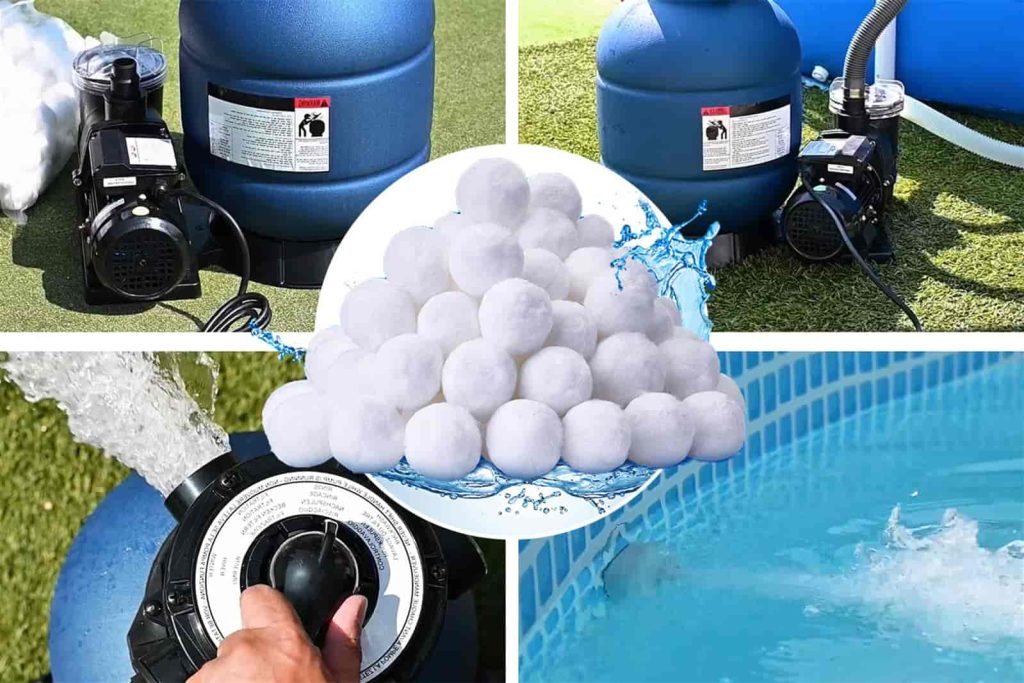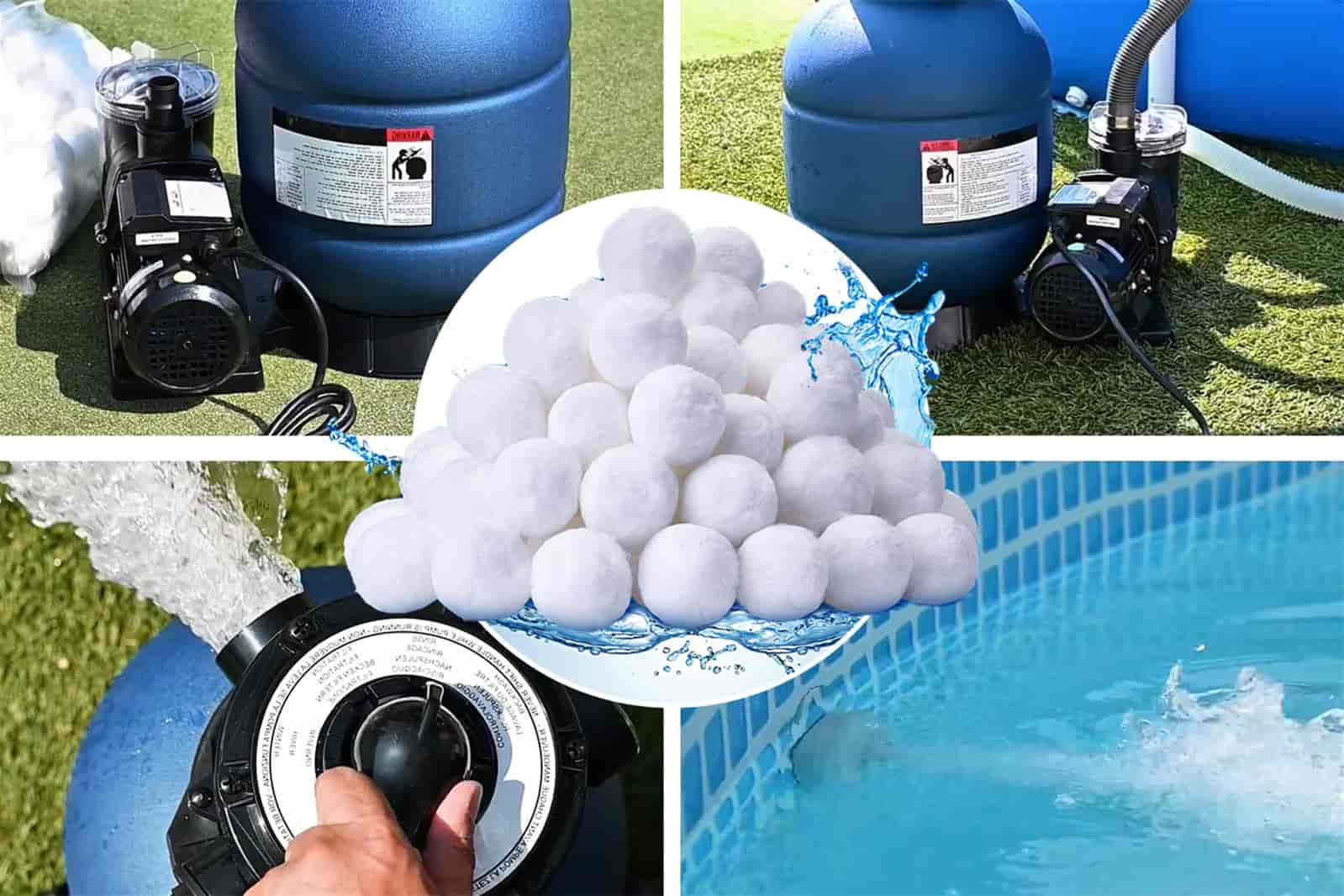When it comes to maintaining a crystal-clear swimming pool, choosing the right filtration system is essential. Two popular options for pool owners are pool filter balls and the traditional sand filter. Both systems aim to keep your pool water clean by removing debris and contaminants, but they do so in different ways and have distinct advantages and disadvantages. In this blog, we’ll talk about the key differences between these two filtration methods, helping you determine which one might be the best fit for your pool.

What Are Pool Filter Balls?
Pool filter balls are an innovative alternative to traditional sand in pool filtration systems. Made from polyethylene fibers, these tiny, lightweight balls are designed to capture debris as water passes through them. Despite their small size and low weight, pool filter balls are highly effective at filtering out even the tiniest particles, down to just a few microns. This allows them to provide a superior level of filtration compared to sand filters, which typically capture particles as small as 20 microns.
One of the biggest advantages of pool filter balls is their ease of use. They are incredibly lightweight, making them much easier to handle than heavy bags of sand. Plus, because they are reusable and washable, you won’t need to replace them as frequently as you would with sand. This can save time and money in the long run.
What Are Sand Filters?
A sand filter is a traditional method of pool filtration that has been used for decades. These filters use a bed of sand as the filtration medium. As water flows through the sand, dirt, debris, and contaminants get trapped in the tiny spaces between the sand particles. Clean water then flows back into the pool, leaving behind the unwanted particles in the filter.
One of the primary benefits of sand filters is their durability. They can last for several years with proper maintenance, and replacing the sand is a relatively simple process. Sand filters are also cost-effective and have been trusted by pool owners for a long time.
However, there are some downsides to sand filters. For starters, they tend to require more frequent backwashing, which wastes water and adds to maintenance time. Additionally, sand doesn’t filter as finely as pool filter balls, so tiny particles can still find their way into the pool water.
Key Differences Between Pool Filter Balls and Sand Filters
1. Filtration Efficiency
One of the most significant differences between pool filter balls and sand filters is the level of filtration they provide. Pool filter balls are capable of filtering out much smaller particles than sand. While sand filters typically capture particles as small as 20 microns, filter balls can trap particles as small as a few microns. This means you’ll get clearer, cleaner water with filter balls, especially if you have a pool prone to fine debris like pollen or dust.
2. Maintenance
Maintaining your pool filtration system is an important factor to consider when choosing between filter balls and sand. Pool filter balls are much easier to maintain. They can be washed and reused, reducing the need for frequent replacement. Additionally, they don’t require backwashing, which saves water and time. Sand filters, on the other hand, require regular backwashing to remove trapped debris, which not only wastes water but can also lead to higher utility bills.
When it’s time to replace the filter medium, pool filter balls are also easier to handle. They’re lightweight and easy to pour into the filter housing, unlike sand, which can be heavy and cumbersome to manage.
3. Durability
Both pool filter balls and sand filters are durable, but they differ in how long they last. Sand typically needs to be replaced every 3 to 5 years, depending on usage. Over time, the sand particles become smooth and less effective at capturing debris, meaning you’ll need to replace them to maintain filtration efficiency.
Pool filter balls, however, can last even longer because they’re designed to be reusable. With proper care and regular cleaning, filter balls can last several seasons before needing replacement, making them a more cost-effective option in the long term. If you’re looking for high-quality filter balls, choosing a reputable pool filter balls manufacturer can ensure you get long-lasting products that perform well.
4. Water Conservation
If water conservation is a priority for you, pool filter balls are the clear winner. Unlike sand filters, which require regular backwashing to clean out trapped debris, filter balls do not need this process. This means that using filter balls can significantly reduce water waste. For eco-conscious pool owners, this is a big advantage over traditional sand filters, which can waste hundreds of gallons of water over the course of a season.
5. Cost
Upfront, pool filter balls can be more expensive than sand. However, when you factor in the reduced maintenance costs, longer lifespan, and water savings, they may actually be more economical in the long run. Sand is generally cheaper to purchase upfront, but the frequent backwashing, water waste, and eventual need for replacement add up over time.
For budget-conscious buyers, it’s worth exploring cheap pool filter balls options from trusted suppliers. While they may cost more initially, the savings on maintenance and water use can make them the more cost-effective choice.
Which Option is Better for Your Pool?
The choice between pool filter balls and sand filters ultimately depends on your pool’s specific needs and your priorities as a pool owner.
If you prioritize ease of maintenance, superior filtration, and water conservation, pool filter balls are likely the better option. They offer finer filtration, require less frequent maintenance, and don’t need backwashing.
If you’re looking for a more cost-effective solution upfront and don’t mind regular maintenance, a sand filter might be the way to go. Sand filters are reliable and durable, and they’ve been a staple in the pool industry for years.
Either way, both filtration systems can keep your pool clean and safe for swimming. If you’re unsure which option is best, consulting a pool filter balls manufacturer or a pool professional can help you make the right decision for your setup.
Conclusion
Both pool filter balls and sand filters have their advantages and disadvantages. Pool filter balls provide superior filtration, are easier to maintain, and are more eco-friendly, while sand filters are cost-effective and long-lasting. By understanding the differences between these two systems, you can choose the best option for your pool and enjoy cleaner, clearer water all season long!

